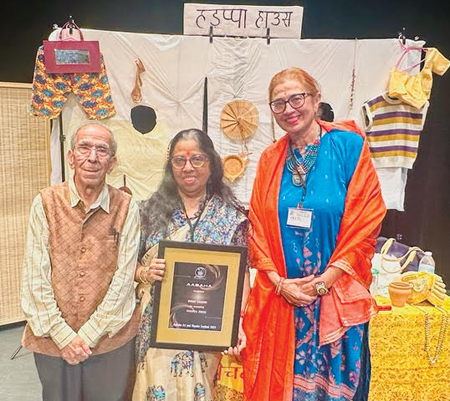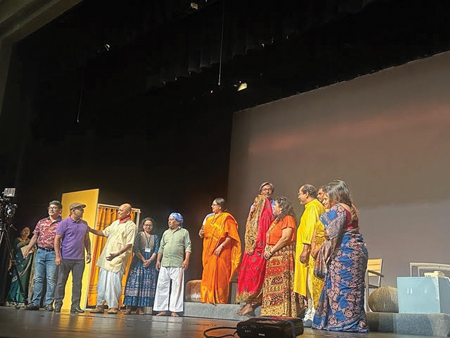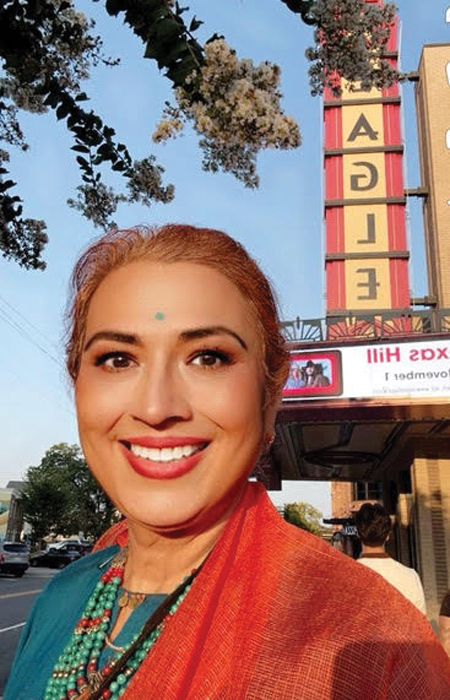Aabaha Art and Theater Festival 2024: A Cultural Bonanza

The Aabaha Art and Theater Festival 2024 at the Eagle Theater on August 11 and 12 was a significant cultural event, adding a feather to the city's cultural landscape with its array of seven plays, an art show, and book launches. The event was not merely a collection of performances but a true cultural homecoming for the Bengali community as well as the larger Indian community in the greater Atlanta area.
 The festival commenced with a well-organized inauguration ceremony, attended by the Mayor of Sugar Hill, Brandon Hembree, who delivered a welcoming speech and stayed through the entire performance of the play "Wretched Land." When asked about his impressions, Mayor Hembree appreciated the experience, stating, “I liked the fact that I could not understand the language because it forced me to pay attention to the actors and their emotions.” He also liked the Q&A session after the performance. The Indian Consulate in Atlanta was represented by Shri Madan Kumar Ghildayal, who encouraged the Indian community to stay connected to “their roots” through theater, music, dance, and cuisine to prevent younger generations from becoming “rootless.” Dr. Raktim Sen, a distinguished director whose thought-provoking play “The Box” was showcased at the festival, was honored for his ongoing contributions to Bengali theater.
The festival commenced with a well-organized inauguration ceremony, attended by the Mayor of Sugar Hill, Brandon Hembree, who delivered a welcoming speech and stayed through the entire performance of the play "Wretched Land." When asked about his impressions, Mayor Hembree appreciated the experience, stating, “I liked the fact that I could not understand the language because it forced me to pay attention to the actors and their emotions.” He also liked the Q&A session after the performance. The Indian Consulate in Atlanta was represented by Shri Madan Kumar Ghildayal, who encouraged the Indian community to stay connected to “their roots” through theater, music, dance, and cuisine to prevent younger generations from becoming “rootless.” Dr. Raktim Sen, a distinguished director whose thought-provoking play “The Box” was showcased at the festival, was honored for his ongoing contributions to Bengali theater.
 For me, the day's highlight was the woman-centric performance of "Wretched Land," a play written and directed by Debasis Majumdar, originally staged in India in 1998. This hard-hitting satire on social evils like child marriage and gang rape explored the efforts of NGOs to expose the feudal landlords who perpetrate these crimes. The narrative follows Manikuntala and Srijika, two women activists striving to bring justice to Poonam, a rape victim who symbolizes countless silenced voices in rural India. The portrayal of Poonam by local epidemiologist Harpriya Kaur, in her debut role, was both powerful and heart-rending, adding depth to the play's emotional impact. Debasis Majumdar, present in person, lamented that such “social evils” still lurk in society, making his play as relevant in 2024 as it was in 1998. The audience believed that this dusky lady in rural garb, with her anguished cry, was a “real” victim!
For me, the day's highlight was the woman-centric performance of "Wretched Land," a play written and directed by Debasis Majumdar, originally staged in India in 1998. This hard-hitting satire on social evils like child marriage and gang rape explored the efforts of NGOs to expose the feudal landlords who perpetrate these crimes. The narrative follows Manikuntala and Srijika, two women activists striving to bring justice to Poonam, a rape victim who symbolizes countless silenced voices in rural India. The portrayal of Poonam by local epidemiologist Harpriya Kaur, in her debut role, was both powerful and heart-rending, adding depth to the play's emotional impact. Debasis Majumdar, present in person, lamented that such “social evils” still lurk in society, making his play as relevant in 2024 as it was in 1998. The audience believed that this dusky lady in rural garb, with her anguished cry, was a “real” victim!

 The meticulous attention to detail in depicting Bengali culture and lifestyle stood out in the preparation of the sets, artwork, and furniture. The cast wore traditional attire, with women in vibrant Bengal cotton sarees and men in simple yet elegant kurtas. Batik table covers, handloom cotton curtains, and bags brought to life a typical Bengali household, creating an immersive experience for the audience. The dialogue, delivered in Bengali and Bhojpuri, resonated with the linguistic and cultural authenticity of the region, evoking nostalgia in the audience. For me, the play was a journey back to my childhood in Calcutta, where I learned Bengali at the Nava Nalanda School in the third grade. Watching the performance reminded me of the beautiful round faces of Bengali women, dressed in their gold jewelry, the philosophical dialogue of Bengali men, and the rich cultural heritage that has endured over the years. It was as if the language, long dormant in my memory, had been reawakened by the power of theater.
The meticulous attention to detail in depicting Bengali culture and lifestyle stood out in the preparation of the sets, artwork, and furniture. The cast wore traditional attire, with women in vibrant Bengal cotton sarees and men in simple yet elegant kurtas. Batik table covers, handloom cotton curtains, and bags brought to life a typical Bengali household, creating an immersive experience for the audience. The dialogue, delivered in Bengali and Bhojpuri, resonated with the linguistic and cultural authenticity of the region, evoking nostalgia in the audience. For me, the play was a journey back to my childhood in Calcutta, where I learned Bengali at the Nava Nalanda School in the third grade. Watching the performance reminded me of the beautiful round faces of Bengali women, dressed in their gold jewelry, the philosophical dialogue of Bengali men, and the rich cultural heritage that has endured over the years. It was as if the language, long dormant in my memory, had been reawakened by the power of theater.
During the intermission, I mingled with the cast and crew. Their dedication to bringing this story to life was evident in their performances, and their passion for theater shone through in our conversations. As I wandered through the art exhibition, admiring rare black-and-white photographs and clay artifacts, I found myself in deep conversations about India with total strangers. Sharing traditional snacks like fish cutlets and puchka with the audience added to the sense of community and belonging that permeated the event.

In the evening, I laughed out loud watching the parody "Harappa House," presented by the Dhoop Chaoon production house. Adapted from K. P. Saxena’s play, director Sandhya Saxena Bhagat brought to life a hilarious comedy. A self-proclaimed archaeological store run by conman Firdausi and his brother-in-law boasts of selling historical items collected from junkyards. They manage to make a “dishonest” living until Ms. Palkiwala comes hunting for a rare antique—Khilji’s tooth. The vendors at Harappa House try their best to sell the lovely lady other antiques with songs, stories, dances, and jugglery, but Ms. Palkiwala is set on obtaining another denture from the late Alauddin Khilji to get even with her friend “Ms. Jhunjhunwala!”  Finally, the police arrive to arrest them, but the odd “jeeja-sala” duo gets away after stealing the constable’s baton! Dhoop Chaoon thrives on keeping the Hindi language alive through “naatak.” This group has performed at various venues in Atlanta, the Bay Area, and Nashville. Come September, they are flying to Mauritius! Their plays bring a unique flavor to ordinary life events, offering a blend of drama, satire, and social commentary that resonates with contemporary audiences.
Finally, the police arrive to arrest them, but the odd “jeeja-sala” duo gets away after stealing the constable’s baton! Dhoop Chaoon thrives on keeping the Hindi language alive through “naatak.” This group has performed at various venues in Atlanta, the Bay Area, and Nashville. Come September, they are flying to Mauritius! Their plays bring a unique flavor to ordinary life events, offering a blend of drama, satire, and social commentary that resonates with contemporary audiences.
Aabaha is a collective of non-equity theater enthusiasts based in greater Atlanta, driven by a desire to explore the endless possibilities of this unique art form and a tireless quest to engage audiences on a deeper emotional level. According to Kallol Nandi, one of Aabaha's founders, it is the first Indian theater group in Atlanta to receive a grant from the Georgia Council for the Arts. The Aabaha Art and Theater Festival 2024 was not just a showcase of performances but a celebration of Bengali culture in its many forms. It brought together art, theater, and tradition, creating an environment where the past and present intertwined, offering both nostalgia and a renewed appreciation for the richness of our cultural heritage and collective transformation.
- Monita Soni
| Remember, we have new Website Bonus Features that are not in the print magazine. Every time you see the W symbol in the print magazine, you can go to our website to see additional print or audiovisual material! |
|
Submitting your report for consideration in Around Town Please send post event reports for consideration in the Around Town section to AroundTown@khabar.com. Publication of reports is based on several criteria including the volume of reports submitted for a given issue. Guidelines for the reports are on our website at http://www.khabar.com/magazine/around-town/guidelines_for_submitting_reports_to_around_town. Deadline: 15th of each month—for consideration in the following month. However, chances of inclusion are better if reports are received well in advance of the deadline – where possible, e.g. within 3-7 days of the event.
|
Enjoyed reading Khabar magazine? Subscribe to Khabar and get a full digital copy of this Indian-American community magazine.











